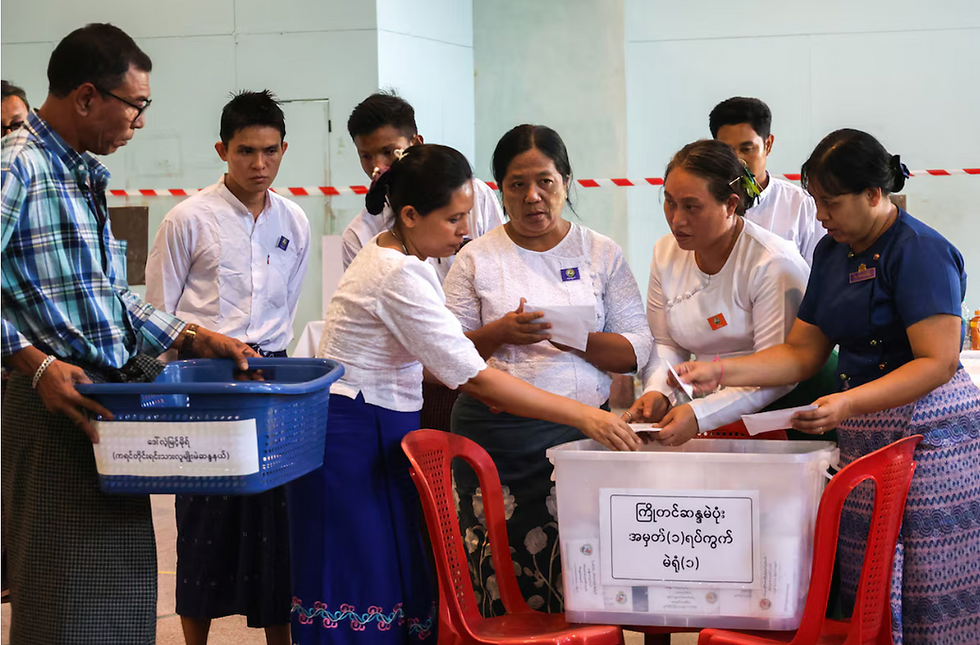“The Big Family Gathering” LGBTQ+ Rights and Persecution in Türkiye
- Human Rights Research Center
- Oct 17, 2023
- 4 min read
Author: Autumn Coalwell
October 16, 2023

While attending the United Nation’s 78th General Assembly in New York City, President Recep Tayyip Erdogan expressed his discomfort seeing the bright colors adorning the United Nations 2023 Sustainable Development Goals banner because they resembled the colors of the LGBTQ+ flag. He went on to state that family values are under attack, and that opponents to LGBTQ+ rights have as much right to speak out as those who are supporting the community. In 2015, the European Region of the International Lesbian, Gay, Bisexual, Trans, and Intersex Association (ILGA-Europe) provided a ranking of 49 European countries based on their level of LGBTQ+ equality; Türkiye was ranked at position 47 of 49 (Göçmen & Yılmaz, 2016).
President Erdogan’s campaign has been built on the idea of family values, and he has made it exceedingly clear throughout his presidency that LGBTQ+ citizens are a threat to that image. In 2014, after Istanbul saw record attendance to its Pride march, authorities in Istanbul banned future Pride events in the city. A subsequent Pride event held in Istanbul in 2023 saw the arrest and detainment of 113 individuals. Türkiye is seeing a resurgence of anti-LGBTQ+ sentiments and a new movement, known as “The Big Family Gathering'' is demanding the closure of LGBTQ+ associations in the country. The country’s conservatives have blamed LGBTQ+ communities for all manner of society’s ills, including mental illness, suicide, violence, and drug use. The LGBTQ+ rights movement has been portrayed by politicians and conservative organizations as an attack on family values, and thus, a danger to Turkish society.
The Turkish Republic was founded as a secular state, meaning that the government and institution is officially neutral in matters relating to religion. Despite this, conservative Islamic values are deeply ingrained in the institutions and culture of the country. The Turkish constitution states that discrimination is unlawful. However, it does not specify what constitutes “discrimination”. Same-sex marriage and relationships are not legally recognized in the country, and although transgender individuals can request a legal gender change, the process to do so is highly complex and dependent upon the understanding and goodwill of the medical community and legal officials reviewing the request. LGBTQ+ citizens in Türkiye face discrimination in the workplace and when seeking medical care. Lesbian, gay, and bisexual individuals in Türkiye are often forced to hide their sexual orientation and risk losing their job or being passed over for promotions if they come out (Bradford, 2021). Transgender individuals face even higher levels of discrimination, with many experiencing physical and emotional violence in their everyday life. Transgender individuals have a more difficult time finding work, and many are eventually forced to resort to sex work to make a living (Engin, 2015).
In 2016, a study conducted by Göçmen and Yılmaz (Göçmen & Yılmaz, 2016) used internet surveys to collect quality of life data from non-cisgendered and non-heterosexual individuals across Türkiye. The more than 2,000 responses they received revealed a dire situation; The majority of respondents stated that they were not comfortable revealing their sexual identity at work, and over half of respondents reported currently being without employment. In 2022, Kaos GL, one of the oldest LGBTQ+ organizations in Türkiye, reported violations of LGBTQ+ rights including censorship and bans on their right to assemble, perform, publish books, and broadcast. Hate rallies were held in 15 provinces under the protection of the state. Police violence, public violence, and political hate speech against the LGBTQ+ community were common, and crimes against LGBTQ+ individuals continued to go unpunished (Koçak, 2023).
Despite these challenges, the LGBTQ+ community in Türkiye is vibrant and active. LGBTQ+ associations and student clubs exist across the country, and before being banned in 2015, the Istanbul Pride March had taken place for 13 years. Although the two largest political parties, Erdogan’s Justice and Development Party and the Nationalist Movement Party, are in strong opposition to LGBTQ+ rights, smaller parties like the Republican People's Party and the People's Democratic Party have been pressuring the government to introduce legislation protecting equal rights based on sexual orientation and gender identity. However, under the decade long rule of the Justice Development Party, no significant progress has been made.
Although discrimination against the LGBTQ+ community is not unique to Türkiye, the situation there is especially concerning for human rights organizations. LGBTQ+ individuals face public, private, and institutional discrimination, and cases of violence against LGBTQ+ individuals are on the rise. Politicians continue to inflame the situation through their own hate speech and even go as far as inciting violence against the LGBTQ+ community. The country needs a rejuvenated political movement that seeks to overcome the long-term hold that Erdogan and the Justice and Development Party have on the country. A change in political power could usher in legislative protections for vulnerable populations across Türkiye, and an increase in political tolerance could help guide the nation towards a corresponding increase in cultural tolerance.
References
Bradford. (2021). Study shows big differences between experiences of LGBT people in Turkey and the UK. Human Resource Management International Digest, 29(3), 4–5. https://doi.org/10.1108/hrmid-09-2020-0208
Engin, C. (2015). LGBT in Turkey: Policies and Experiences. Social Sciences, 4(3), 838–858. https://doi.org/10.3390/socsci4030838
Göçmen, İ., & Yılmaz, V. (2016). Exploring Perceived Discrimination Among LGBT Individuals in Turkey in Education, Employment, and Health Care: Results of an Online Survey. Journal of Homosexuality, 64(8), 1052–1068. https://doi.org/10.1080/00918369.2016.1236598
Koçak, S. (2023, February 4). 2022 for LGBTI+s: The policy regarding the elimination of LGBTI+s from public sphere is in force. Kaos GL - News Portal for LGBTI+. https://kaosgl.org/en/single-news/2022-for-lgbti-s-the-policy-regarding-the-elimination-of-lgbti-s-from-public-sphere-is-in-force
Nichols, M. (2023, September 21). Colors promoting UN goals or LGBTQ rights? Turkey’s Erdogan complains. Reuters. https://www.reuters.com/world/colors-promoting-un-goals-or-lgbtq-rights-turkeys-erdogan-complains-2023-09-21/



